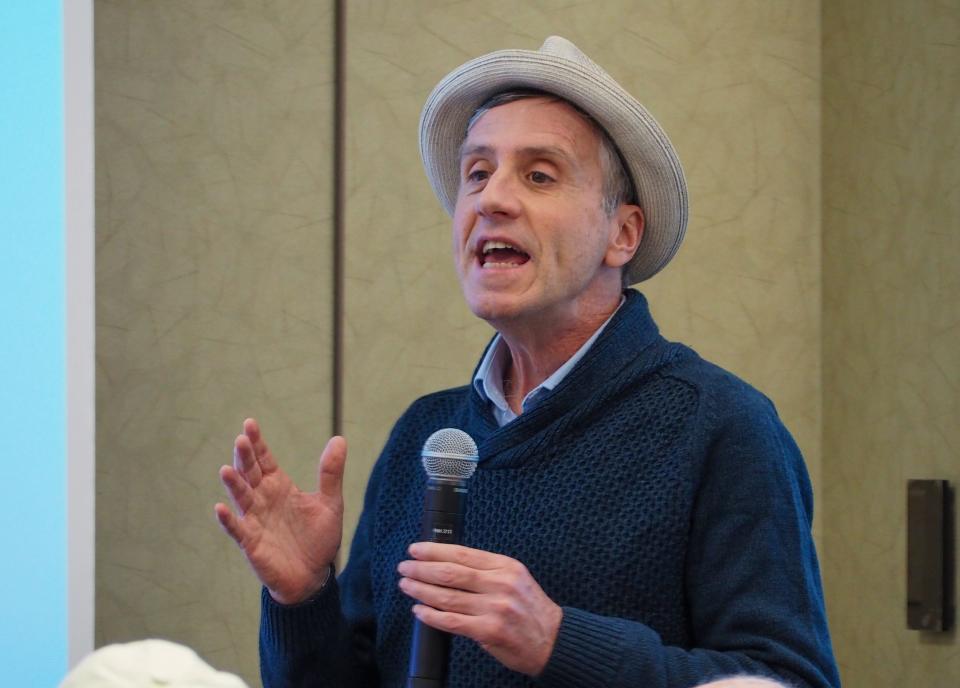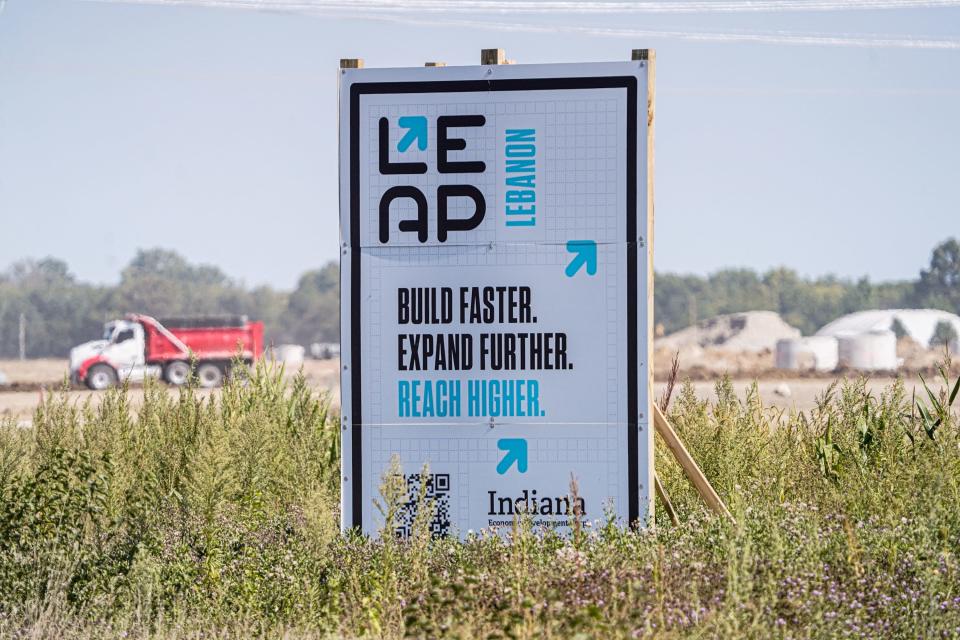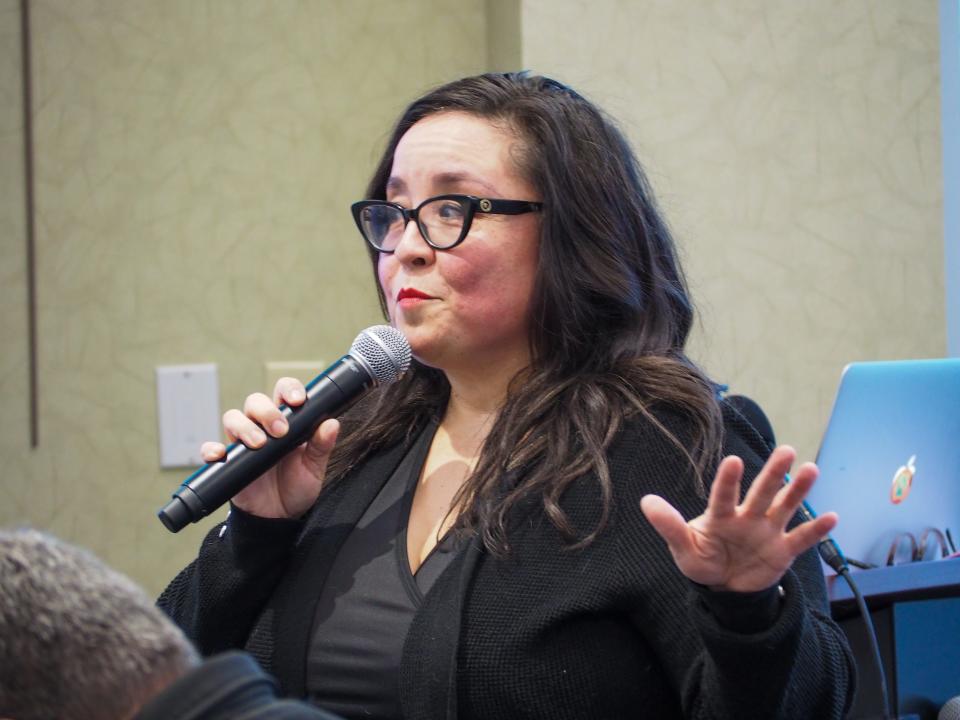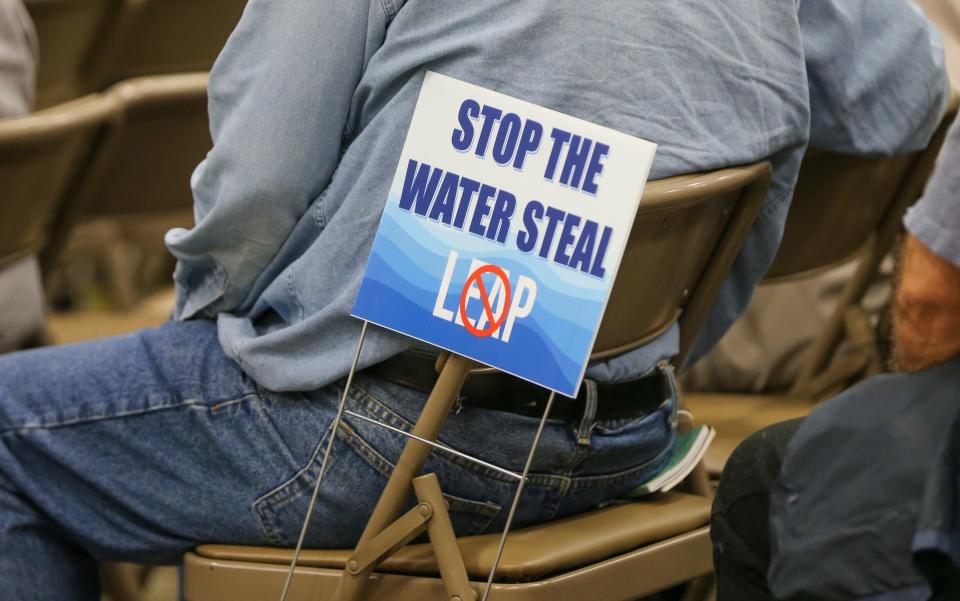Residents don't want water piped from a river to a development district. Will Holcomb stop it?
- Oops!Something went wrong.Please try again later.
Pressure has been building in the Lafayette area for the better part of the year in opposition to the Indiana Economic Development Corporation's proposal to pipe water from the Wabash River down to a multibillion-dollar development district in Boone County.
And recently, Gov. Eric Holcomb inserted himself into the controversy by ordering responsibility for a key water study be handed to a different stage agency ― a move some residents are interpreting as a nod to their concerns, while the IEDC says this was the plan all along. The actual ramifications remain unclear.
"We’ve not achieved victory," said David Sanders, a West Lafayette city councilor who helped organize a Stop the Water Steal group. "We’re nowhere near the finish line on this process. But we have the governor’s ear now."
Holcomb has ordered the Indiana Finance Authority ― another quasi-governmental body, but one that has overseen several previous Indiana water studies ― to take over oversight of a study by engineering firm INTERA into the capacity of the Wabash River aquifer, which the IEDC commissioned. This is expected to be completed and peer-reviewed in January.
At the same time, Holcomb ordered the IFA to speed up its timeline on a planned regional water study for a 13-county region in north central Indiana that includes the Lafayette area ― the fourth regional water study the agency has conducted since 2017. The INTERA study would be incorporated into this larger study of the region's future water capacity, which is scheduled for completion in the fall of 2024.

Holcomb also asked the IFA to install water monitoring devices throughout the region to track water usage and availability in real time.
“I am confident that these new efforts led by IFA will provide the necessary data to gain a greater understanding of the amount of excess water that is truly available to support all the surrounding region’s growth prior to any action being taken that could inadvertently jeopardize this needed resource," Holcomb stated. "No entity is better suited to lead this overall pursuit than the IFA which will approach this study in the same methodical, collaborative, and transparent manner the organization has conducted in the past.”
Secretary of Commerce David Rosenberg, who leads the IDEC, applauded the transition in a statement.
"I'm proud of the work the IEDC team has done to identify and begin the study on what has shown to be one of the most productive water assets in the state," he said. "The IFA has been a partner from the very beginning, and as we move into the execution phase, they are the right experts to continue the INTERA water supply study and incorporate its findings into their comprehensive regional water study."
Holcomb's order is the latest development as the simmering tensions have become a political issue and brought attention to Indiana's lack of a statewide, comprehensive plan for managing its water resources.
When asked whether the move is a concession to residents who feel the IEDC hasn't been transparent enough with its plans and research, the IEDC referred questions to the IFA. IFA officials said the authority is the "appropriate organization to take the INTERA information compiled to date and include it in the larger/regional study." The INTERA study is nearly complete, according to the IFA.
Holcomb's spokesperson deferred to his earlier statement.

How we got here
The IEDC commissioned engineering firm INTERA to study whether the Wabash River aquifers could support development in the new LEAP district without hurting the greater Lafayette community. But the quasi-governmental agency signed a $10 million contract to design a pipeline, long before having preliminary results from their study.
More: Water isn't only a Western problem. Here's why some Hoosiers are worried about running out
IEDC and INTERA have been pointing to decades-old maps that show the Wabash River is abundant, and they say these more detailed studies should merely prove their hypothesis. Utilities move water from where it is to where it's needed all the time, INTERA Vice President Jack Wittman previously told IndyStar.
"It’s very normal, and it’s kind of an aspect of water we don’t normally think about," he said.
But to residents, it has felt like the IEDC is putting the cart before the horse, which has bred distrust.
"These are huge questions, and so why wasn’t the science done years ago?" asks Sandra Alvillar, president of Stop the Water Steal.

The group formed a month ago and has distributed yard signs with their namesake slogan all over Tippecanoe County, and even down to Boone County. Their goal, Alvillar said, is to be primarily a resource for research.
At the same time, some Republican state lawmakers have been working on legislation to address their constituents' concerns. State Rep. Sharon Negele, R-Attica, and state Sen. Spencer Deery, R-West Lafayette plan to author a bill this session that would create a permitting process for water withdrawals larger than 10 million gallons a day ― a process that would require public notice and peer review.
Negele said she isn't surprised that Holcomb intervened ― especially as residents have continued to get more organized.
"(Sen. Deery and I) made it very clear to the governor's office that this is not going away," she said.
In that sense, the step isn't a negative, from where her constituents sit. But they also can't tell if it's a positive.
"The question is is this going to be enough to calm the population in my district and their concerns?" she said. "And I don’t think it will be."

Will things be different under the IFA?
A key concern among residents is a perceived lack of transparency from the IEDC about the pipeline idea. For the first half of the year, the IEDC was absent from public meetings on the subject; WTHR reporter Bob Segall still has a complaint pending with the Indiana Public Access Counselor over the IEDC's heavily redacted response to a public records request.
Under Indiana law, the IFA and the IEDC appear to be "functionally equivalent" with respect to public records access, Public Access Counselor Luke Britt said. They are both considered a "public agency" that must respond to requests.
"That stated, both would have discretion to release material but nothing is de facto confidential in those laws," he said. "I can’t speak to how IFA exercises that discretion on a day-to-day basis."
In other words, there's no guarantee that the IFA would be any more likely to satisfy residents' concerns about transparency.
"While the IFA doesn't have the same kind of conflict of interest in this matter that the IDEC does, it's still part of state government," said Julia Vaughn of Common Cause Indiana. "An independent, non-government commissioned study is what is really needed to provide an objective opinion on this that all sides can trust."
Both the current and immediate past IEDC presidents ― the latter being a candidate for Indiana governor, Brad Chambers ― say the IFA has been a "partner" since the beginning of the IEDC's exploration of LEAP's water issues.
"This was always the plan," Chambers said in a statement, referring to kicking the responsibility over to IFA. "Infrastructure falls under the purview of the Indiana Finance Authority (IFA) — not the IEDC — and they have been partners in this project since day one. I look forward to them completing their studies and the LEAP District producing high-wage careers for Hoosiers long into the future."
IFA officials said the two agencies discussed Indiana's water needs "more than a year ago," which prompted a recent IFA study of resources in Clinton County, east of Lafayette.
A key difference between the IFA and the IEDC, though, is the IFA has a history of overseeing complex water studies.
Since 2018, the IFA, which is not a state agency but acts as the state's bond issuer, has been conducting regional examinations of Indiana's water supply and whether it will be able to support population growth over the next 50 years. INTERA has been the lead contractor on several of them, though the state Department of Natural Resources, Indiana Geological and Water Survey and United States Geological Survey have also chipped in.
Residents are hoping that the IFA will communicate updates and results often with them, and in layman's terms.
"I want to trust Holcomb, I wanna believe this is a step in the right direction," Alvillar said. "But without a ton of transparency, and when there’s a lot of vague wording, that to me is a red flag."
Contact IndyStar state government and politics reporter Kayla Dwyer at kdwyer@indystar.com or follow her on Twitter @kayla_dwyer17.
This article originally appeared on Indianapolis Star: LEAP water pipeline: Indiana governor intervenes as residents organize

